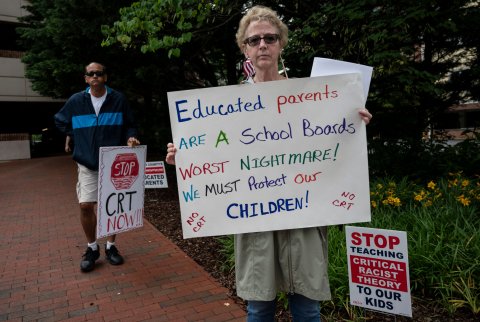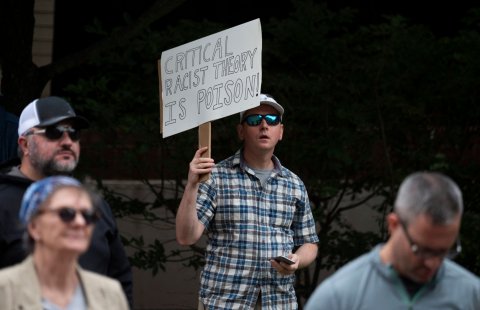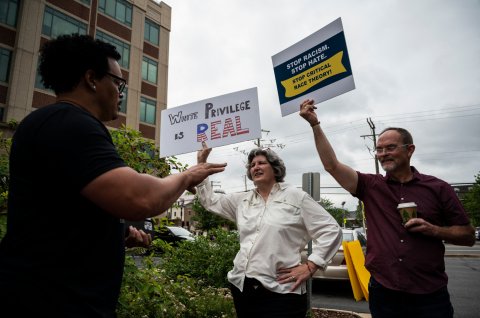When Tawiona Brown approached the lectern at a June Perrysburg Schools board meeting in Ohio, she brought along two blank pieces of paper. Her aim was to convey the experiences of her 17-year-old son Josiah "from a parent's perspective."
"'Josiah, you like watermelon?'" she said, as she began crumpling one sheet of paper in her hands.
"'You're an n-word with a hard R.'
"'Is the resource officer after you today, Josiah? I saw him following you around.'"
Still holding the wrinkled piece of paper, Brown then raised the other pristine sheet, an illustration of children's "clean slate" when their parents send them to school.
"When your babies come home to you, mentally, this is what they should look like," she said.
"Nice, even, smooth, nothing wrong. When my baby—and he's a big boy, and I still call him my baby," Brown continued, unfurling the wad of paper to reveal its creases. "When he comes home to me, mentally, this is what I have to clean up with my son."
Brown's speech followed commentary from parents alarmed by the notion of critical race theory, or CRT, covertly permeating local schools.
On par with nationwide rhetoric, the Perrysburg school board was accused of couching critical race theory with milder terminology, indoctrinating students, and impairing children's sense of self. Some painted a Perrysburg cultural intelligence initiative as a CRT Trojan horse.
Perrysburg is one of many districts across the U.S. in which K-12 schools were rendered arenas for spiraling culture wars in recent months. As the critical race theory controversy mushroomed within America's public discourse, education boards experienced drawn-out meetings packed with members of the public and laden with tension.
Fiery hostilities towards critical race theory were stoked by impassioned condemnation from the nation's most influential conservatives. Former President Donald Trump said CRT borders on "psychological abuse" and has deemed it a "program for national suicide." On July 14, Republican Senators Tim Cotton of Arkansas and Dan Bishop of North Carolina introduced a bill to bar federal funding from going to K-12 schools that supposedly promote critical race theory.
CRT was a near-constant hot topic on Fox News when the issue was at its peak. The network has mentioned it upwards of 1,900 times in the past several months, according to left-wing media watchdog Media Matters For America. On his Fox show, the most-watched in cable news, Tucker Carlson called for cameras in classrooms to monitor teachers, should they teach children such "poison."
While used as a catch-all term with ever-changing applications, CRT does not refer to diversity and inclusion initiatives, nor apply to K-12 schools. Rooted in the legal academy since the 1970s, critical race theory is the intellectual practice of examining race as a social construct and racism as ingrained within institutions.
Tanya Hernandez, professor of law at Fordham University and author of upcoming book On Latino Anti-Black Bias: "Racial Innocence" and the Struggle for Equality, said critical race theory does not perceive the removal of "formal barriers to inclusion," such as Jim Crow-era segregation, as sufficient to achieve the societal goal of racial equality.
"Instead, critical race theory goes much deeper than that and looks at the ways in which there are systems and structures in place that account for so much racial disparity that has nothing to do—or often, not as much to do—with individual intent," she told Newsweek.
Hernandez added CRT does not contend that there are "inherent deficiencies to peoples and groups that accounts for racial disparity and socio-economic inequality."
Opponents to what is perceived to be critical race theory are, in reality, reacting to "misinformation that sings upon a particular note," according to Hernandez. It plucks at a string that "equates any racial progress with a loss of white status," which poses a threat to "quality, truthful education."
"This reactionary response and attempt to censor, this almost McCarthyite labeling of critical race theory in society, this is new," Hernandez said. "And it's not from people who actually care to know or know anything about the truth of what critical race theory is."

At the school district level, anti-CRT fury manifests as painting educators like Pied Piper operatives luring children into Marxist thought, alleging rampant oppression of white students while privileging students of color, rehashing Martin Luther King, Jr.'s "content of character" quote, and denying any semblance of structural racism in the U.S.
But school board meetings have also served as a platform for Black parents and students to testify on their lived experiences with racism in schools—a stark contrast to the common core of swirling narratives by CRT critics now drowning them out.
Tawiona Brown, an adjunct professor for physical therapy assisting, told Newsweek she had no intention of speaking at the Perrysburg school board meeting but felt compelled to take the floor after hearing "hurtful" statements from other parents.
Josiah, her eldest, will soon enter his senior year following racially motivated torment throughout his freshman and sophomore years.
"It hurts me to know that for an entire year, my son didn't tell me anything about people calling him the n-word and slapping his books out of his hands," Brown told Newsweek. "No parent wants their child to go through things like that."
Brown said her son was called a monkey on the same day as a social studies class that covered racial slurs towards African Americans. When a parent brought watermelon to his school football team, Josiah became the target of stereotype-based mockery by his teammates.
He once confronted teammates who had derisively instructed another African American player to sit at the back of the bus for an away game. Following the killing of George Floyd and the ensuing tidal wave of Black Lives Matter protests, a student on Josiah's football team posted a photo of himself and his brother carrying firearms emblazoned with a Confederate flag. The caption read: "Come protest here."
Brown said she was preemptively contacted by her son's football coach, who assured her the matter was being handled. The student remained on the school football team until he graduated.
"I don't think the Caucasian parents—they don't realize or understand, or even want to understand that that's what my child has gone through," Brown said.
She attended a predominantly white high school in Toledo, Ohio, where the mascot was a Confederate soldier. As a student, she once helped scrub off the n-word that was spray-painted on the classroom door of her English teacher, an African American woman.
"You see in the news now, all the time, 'There's no social inequity here, there's no systemic racism in the United States,'" she said.
"For me, critical race theory is all about trying to unearth it so that everyone can see it, so that it cannot be denied. And I think that's the biggest fear."
Black Trauma v. Board of Education
In Yorktown Heights, New York, a July meeting of the Yorktown Central school board saw a couple emotionally recount a recent incident involving their 10-year-old daughter.
George and Galit Price, who are respectively Black and white, said their child was called the n-word "for what it meant" on a school bus in early May.
Galit Price, choked up with heartbreak, said: "I don't believe in critical race theory in that sense. Do I believe that things are wrong? Do I believe that we have to teach each other, to learn from each other? One hundred percent."
George Price mentioned a video in which a Yorktown parent was filmed with anti-CRT activist Tatiana Ibrahim from Carmel, New York. In the video, the women directed their outrage towards a Black Yorktown school counselor named Daks Armstrong.
The pair painted him as a Black Lives Matter activist attempting to "recruit" and "indoctrinate" children. At one point, Ibrahim called Armstrong "Daks-boy."
"We should not let people who do not live in this community put up videos calling somebody that looks like me a 'boy,'" Price said. "I'm offended by that. I'm a grown man, he is a grown man."
Among the speeches that followed the Prices, a white parent stated: "Imagine if your child was taught to feel guilty and ashamed of the color of their skin" in reference to critical race theory purportedly painting white people as oppressors.
Another, who inferred that the degree to which racism is an issue has been exaggerated, asked: "How do you think white children feel when they are called privileged?"
The swelling CRT controversy prompted a number of state legislatures to work on banning it from schools. Texas, Arizona, Tennessee, and South Carolina are among the states to have successfully done so.
North Carolina could soon follow. In May, the state's House of Representatives passed a revised bill that seeks to prohibit public schools from "promoting" a number of "concepts" believed to be discriminatory.
Under HB 324, students cannot be taught that certain people are "inherently racist, sexist, or oppressive, whether consciously or unconsciously." Schools would also be prevented from declaring the U.S. "was created by members of a particular race or sex for the purpose of oppressing members of another race or sex."
In June, two top North Carolina Republican officials criticized Charlotte-Mecklenburg Schools (CMS) for hiring prominent writer Ibram X. Kendi—who authored How To Be An Antiracist—to speak with district leaders. In a joint statement, Senate Leader Phil Berger and Lieutenant Governor Mark Robinson portrayed Kendi's invitation as proof of critical race theory's endorsement in North Carolina schools.
It was no surprise Charlotte-Mecklenburg's July school board meeting was full to the brim with a polarized audience. Parents, teachers, and students delivered remarks to loud cheers and heckling.
Chavon Carroll, a Black mother based in Charlotte, had a story to tell.
"In the third grade, in the CMS elementary school, my child went on a field trip to Latta plantation," she said.
"When she got home and I asked what she learned on the plantation, she told me about farm animals and farming. I asked if she'd learned about slavery, and she looked at me puzzled and said no."
Once Carroll raised the issue with her child's teacher, she was told that North Carolina agriculture, not slavery, is covered in third grade standards for history.
"This is not about a theory that's only taught in college anyway and no CMS student will be learning," Carroll said at the meeting. "This is about making sure white people feel good about history they don't want to remember."

Carroll, who works at an educational equity non-profit organization, told Newsweek she has taken it upon herself to teach Black history to her now 14-year-old daughter in an effort to redress apparent shortcomings in her education.
"It's just making sure my daughter [...] deeply understands her history and doesn't just get relegated to Rosa Parks and Martin Luther King, Jr. in February," she said.
Carroll's 80-year-old father was born in East Chicago, Indiana, only six months after the birth of Emmett Till, the 14-year-old Black teenager who was brutally lynched in 1955 for allegedly whistling at a white woman in Mississippi. East Chicago is named after its geographical proximity to Chicago, Illinois, where Till was born and raised.
"In my mind, that story always resonated with me, 'cause I'm thinking 'That could've been my dad,'" she said.
At one point, Carroll found out her daughter had no idea who Till was, having only come across a paragraph about lynchings in her school history book.
"It's just those kind of things where I've been finding gaps in her education as I ask questions or as I mention things and she's like 'I don't know what you're talking about,'" Carroll told Newsweek. "And so I pull out the books and I'm like, 'OK, you need to read about this' or 'Let me print out an article about it for you to read about this."
Carroll had brought her daughter with her to July's school board meeting, much of which left the teenager "aghast." The CRT controversy appears to have flung open the floodgates of simmering tensions within the Charlotte-Mecklenburg community, prompting a deluge of barbed rhetoric.
Some changes that have troubled the waters include the 2019 appointment of a Black superintendent, Earnest Winston, and the school board adopting new social studies standards in early February in a push to better reflect the perspectives of historically marginalized communities.
"You have a Black superintendent who's fairly new, COVID hit, people had backlash about schools being closed and about masks, then you have [Winston] bringing Ibram X. Kendi, then you have the social studies standards," Carroll said.
"So it was just a perfect storm of cultural tension in the air that I think just exploded with this whole critical race theory that's not really even being taught."
Before making cuts to meet the session's time constraints, the first draft of Carroll's speech would have compared the plantation incident to "taking someone to a concentration camp and talking about the architecture."
"Take them to a farm if you're learning about agriculture," she said. "Don't take them to plantation and then not talk to them about slavery."
Across school districts, education boards were confronted with charges of tone-deaf approaches to teaching African American history to students.
In June, a Black father told the Amherst County school board in Virginia that a third grade teacher taught a lesson on slavery by separating the Black and white students in her class, then instructing the former to "serve" the latter. His daughter was among the five Black children who were told to bring their classmates water and book bags.
In Eureka, a Missouri town that is 92 percent white, a Rockwood school board meeting in May saw parent Danielle Johnson discuss social studies homework assigned to her 10-year-old daughter. While her white classmates were assigned a white character to identify with, Johnson's daughter—who had been the only Black child in her class for the past three years—was asked to describe which job she would have chosen if she were a slave.
"She can pick out which job she wants to be as a slave, but y'all don't want y'all kids to know that y'all privileged," Johnson told the board.
Eureka High School student Kaleigh Ashwood, who had been in the Rockwood School District since kindergarten, said she has been called the n-word "multiple times" and faced jokes about being fatherless because she's Black.
"There's absolutely no way that I can fit my everyday struggles as a Black person, especially in Eureka, in just three minutes," Ashwood said.
"But I can always try. That's all I've ever been doing is try. Trying to fit in with all the white kids, trying not to take things so serious, trying not to be sensitive, and, on top of that, trying to start a group at Eureka for Black students to just tell their stories and feel safe doing so."
Safety concerns for Black members of the Rockwood community came to light in April, when Brittany Hogan—the district's diversity coordinator and the only Black woman in its administration—resigned from her post.
NBC News reported Hogan faced death threats following the superintendent's decision to ban "thin blue line" insignia from baseball uniforms, a decision she was not involved in. Parents also circulated a false rumor that she had tweeted "the problem with public schools is white parents."
The district hired security to patrol her home and that of head of student services Terry Harris, another Black Rockwood administrator targeted with threats to his life.
At May's meeting, Eureka High student Cece Rhodes, whose remarks to the board was read aloud by an adult, called Hogan "an inspiration to every Black student at every Rockwood school" and expressed being "saddened" by her departure.
Close to the meeting's conclusion, board President Jaime Bayes stated the Rockwood School District "is not teaching critical race theory," but is "committed to providing an equitable, welcoming and safe learning environment for all students."
The Miseducation of Black Math Genius
In West Virginia, opponents to critical race theory sought to make a casualty of a summer math camp.
The Black Math Genius Program was offered as part of Jefferson County Schools' Summer Experience, a six-week learning program at no cost to families, including free meals and transportation.
Black Math Genius was designed as a culturally responsive approach to improving Black children's math skills. Internal data from the school district shared with Newsweek found Black students represented Jefferson County's lowest performing demographic in mathematics during the 2018 to 2019 school year.
The program soon became the focal point of a campaign waged by incensed parents. At Jefferson County school board meetings in Charles Town, Black Math Genius drew accusations of CRT in disguise and comparisons to segregation.
Assata Moore, the program's creator, told Newsweek the launch of Black Math Genius was also impeded within Jefferson County schools. Some principals refused to allow promotional flyers at their establishments and educators attempted to dissuade Black families from participating in it.
In response to the backlash, Jefferson County Schools announced the program's suspension in June.

"Some individuals have shared concerns about the Black Math Genius Program, an ancillary summer program aimed at helping students succeed," the district said on its Facebook page. "We have heard those concerns, and are placing the program on hold until they can be addressed."
At a June 15 board meeting, Danielle Grant, a Black mother, told the board she felt "highly disrespected" by the decision.
She said board members did not involve themselves in Black Math Genius' professional development, and parents whose kids the program was designed for were not personally notified of the suspension prior to the Facebook post.
Moore told Newsweek the program was eventually reinstated in July after a month-long delay. Black Math Genius was renamed "Culturally Responsive Math Intervention Program" and cut down from four weeks to two.
Still, a July 27 school board meeting saw renewed attacks on the program. The last parent to take the stand, a white father, lumped supporters of Black Math Genius and critical race theory as "racist."
Following dismayed responses from the audience, he retorted: "Why did these people move here, then? Leave your liberal views at the state border. Don't come in and ruin my area."
The program, which ended recently, was met with "phenomenal" feedback from students, parents, and teachers, Moore told Newsweek. And contrary to claims of segregation, a white student was among the children who attended the math camp.
"I feel and know that intentional ignorance is popular right now," she said. "Their [positive] response lets me know that I'm on the right track and it motivates me more."
A Tale of Two Realities
The community divide was palpable in North Carolina's Moore County but took a different form.
At the July 12 Moore County school board meeting in Carthage, tirades against critical race theory were met with only a handful of dissenting voices. Multiple community members were preoccupied with something else: The imminent sale of land sacred to a historically Black neighborhood.
The Moore County Board of Education is courting offers to sell a 17-acre plot of land in West Southern Pines, grounds that were once home to the West Southern Pines High School. Moore County residents have long urged the board to sell to the Southern Pines Land and Housing Trust, a local non-profit organization that has sought after the land since 2019.
The Southern Pines Land and Housing Trust intends to honor the site's sacrosanct heritage, with plans to build an African American cultural center and museum, subsidized housing for Black teachers, and a variety of local businesses.
The organization recently bumped its offer up to $685,000 following the board's appraisal of the land. On Friday, local news outlet The Pilot reported a $900,000 bid was put forth by homebuilder Ron Jackson—who lost a 2020 GOP primary for county commissioner—and Drain the Swamp, LLC.
West Southern Pines was once its own municipality, incorporated in 1923 as one of North Carolina's first African American towns. The following year, its residents—who made cents in a day's work—raised $6,000 (equivalent to over $95,300 in 2021) to purchase a plot of land and build a school for their children.
The establishment of the West Southern Pines High School was aided by the Rosenwald Fund, a philanthropic initiative that arose from a collaboration between Sears, Roebuck and Co. magnate Julius Rosenwald and educator Booker T. Washington. The fund contributed to the construction of over 5,000 schools, teacher homes, and shops for rural African American communities, primarily in the segregated South.
In their years of operation, Rosenwald schools are estimated to have educated one-third of the South's Black schoolchildren. Poet Maya Angelou and Congressman John Lewis were among their alumni.
The West Southern Pines High School, which had received a $1,500 donation, was one of 16 Rosenwald schools in Moore County. Despite its name, the segregated school educated students at the elementary, middle, and high school levels.
West Southern Pines was eventually annexed by the wider Southern Pines town municipality in 1931.
The West Southern Pines High School was demolished in the 1970s. The property is currently known as the Southern Pines Primary School but sits idle following the construction of a replacement elementary school in the area.
Ariadne DeGarr, the office manager for a non-profit organization serving parents of children with disabilities, told Newsweek her maternal grandparents and mother were among the generations of students educated at the West Southern Pines High School.
Her mother graduated from there in 1961, while her aunt attended the school until 1971 when she entered the integrated Pinecrest High School as a 15-year-old freshman.
DeGarr's grandfather, World War 2 veteran Thaddeus Gay, was known for his entrepreneurial zeal in the tight-knit community, running businesses such as house painting and operating his own printing press. Gay passed away at 98 years old in October 2020.
"He just wanted to bring his community back to what it was," DeGarr told Newsweek. "And so that's now my fight."
DeGarr, a Pinehurst resident who ran unsuccessfully as a Democratic candidate for Moore County commissioner in 2020, is among the community members advocating for the land's sale to the Southern Pines Land and Housing Trust. After watching new "cookie cutter" houses replacing older homes in Southern Pines, she is certain the Southern Pines Primary campus will be torn down to build houses "that are not going to be anything that anyone from West Southern Pines can afford."
The deed to the plot, granted to the Moore County Board of Education in 1924, placed restrictions on an approximately four-acre parcel of the property where the West Southern Pines High School building once stood.
The document specifies these four acres, and any profits that arise from them, must serve "no other purpose whatsoever" than being "devoted to the use of Negro education in and about the Town of Southern Pines and West Southern Pines in recognition of the fact that the money for the purchase of said land was raised by the Negros of said towns."
At the July school board meeting, DeGarr's voice rippled with emotion as she told the board that "entertaining higher bids" over working with the community inflicts "irreparable damage" to West Southern Pines' cultural fabric.
In a session punctuated with thirteen people expressing fears at the notion of critical race theory creeping into schools, another fourteen members of the public voiced their support for the Southern Pines Land and Housing Trust's bid.
After the public comment session concluded, both matters were addressed by two of the school board's newest members. Robert Levy introduced a motion prohibiting schools from promoting concepts ostensibly connected to critical race theory, which passed 6-1.
David Hensley, another board member, brought forth a "compromise" motion to negotiate selling the restricted four-acre parcel of the Southern Pines school property to Southern Pines Land and Housing Trust, while the rest would go to the highest bidder. That passed 5-2.
In his early May appearance on local radio station WEEB, Hensley compared critical race theory—which he said was being taught in Moore County schools—to Nazism under Adolf Hitler.
At a board work session on Monday, Levy stated the Southern Pines Land and Housing Trust's efforts to revitalize the land's historical African American roots were akin to "racial segregation."
"I don't think that we should do something here in the school board that doesn't benefit all the children," he said. "And not just the African American minorities."
In a December 2020 Facebook post, Levy labeled the Southern Pines Land and Housing Trust as "a group that wants to re-visit those horrid days from which that 'strange fruit' grew," a reference to lynching.
History is indelible in the minds of those whose ancestors built the West Southern Pines township. The Sunrise Theater, a local landmark established in the 1940s, is still up and running.
At one point, a hot yoga studio operated out of its upper floor, accessible only by a staircase affixed to the right side of the building. Despite having previously coaxed her daughter to try hot yoga together, DeGarr's 78-year-old mother vowed never to walk up those steps.
During segregation, African Americans were made to take the side stairs to sit in the Sunrise Theater's balcony, separate from white patrons. Black children—DeGarr's mother being one of them—made a game of tossing popcorn on the white children below and evading theater ushers who searched for those responsible.
The staircase has since been replaced, yet the fixture stands as a remnant of past dehumanization.
DeGarr said the theater's owner told her a number of other Black residents will not set foot on the steps, which now lead to a rental space for private parties. Some community elders opted to walk up the stairs purely to experience the freedom of choice previously denied to them.
Herself the mother of a five-year-old boy, DeGarr believes the indignation over critical race theory "plays into" some Moore County school board officials' reluctance to commemorate the rich heritage of Southern Pines Primary's age-old grounds.
"With them banging the critical race theory drum and revving up all of these people, doing all of this fear-mongering, what that says to me is that now, I have to worry even more than I already did when I gave birth to a Black son," she told Newsweek.
"I don't want him to grow up feeling less than. I'm not saying he should feel better than or more than. But all of us should feel like we are worthy and be proud of who we are and where we came from."
Correction 09/03/21, 3:33 a.m ET: This article was updated to correct a misspelling of North Carolina Lieutenant Governor Mark Robinson's name.












